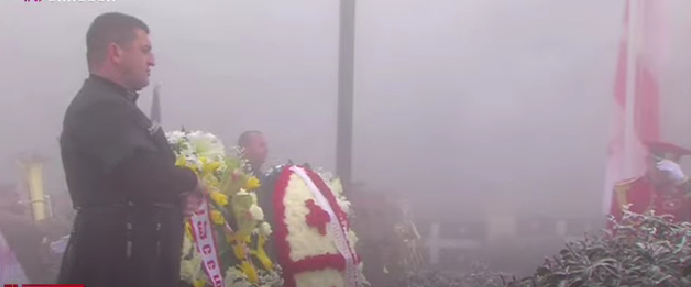
Georgia Marks 103 Years Since Soviet Occupation by Russia
Flags on the government buildings are flying half-mast today as Georgia marks the day when the Russian Red Army took over the Georgian capital on February 25, 1921 after days of heavy battles around Tbilisi.
This day marked the beginning of the forceful Sovietization process of Georgia and is officially marked as the Day of Soviet Occupation in accordance with the resolution by the Georgian Parliament adopted in 2010.
Prime Minister Irakli Kobakhidze, Speaker Shalva Papuashvili, Vice PM and Defense Minister Irakli Chikovani, Tbilisi mayor Kakha Kaladze and members of legislature, as well as opposition representatives, laid a wreath at the Cadet memorial in Kojori in the morning hours of February 25.
President of Georgia Salome Zurabishvili wrote: “Remembering lessons of the past is essential for preserving the future.” She noted: “Today independence and freedom have prevailed. Russian imperialistic attempts to test our resolve, in occupied territories or through hybrid measures, won’t restore the past. Georgia stands free and firm, has moved resolutely towards Europe and no one can derail the path that the Georgian people have freely embraced.” A number of events are planned at the Presidential Palace later in the day to mark the anniversary of the Soviet occupation.
Calling this day “one of the most tragic in the history of Georgia” Parliament Speaker Shalva Papuashvili noted in Facebook post that the newly created republic didn’t manage to counter the “evil force” that “destroyed the prospect of development and freedom for our country” despite “the great efforts of Georgian patriots.”
He added that “the occupation continues today” but that “in contrast to the 20s of the last century, today we are much stronger, sovereign and self-confident. We aim at and have the strength to end the occupation, unify the country and further strengthen the sovereignty of the Georgian state.”
The Defense Minister Irakli Chikovani said: “These are one of the hardest days in the history of Georgia, but at the same time the whole world has seen how great was the courage and patriotism of the defenders of the Georgian state.”
Paying tribute to heroes, reminds us that “we have to cherish freedom and statehood,” said Paata Manjgaladze, one of the leaders of “Strategy Aghmashenebeli” party at the Cadets’ memorial in Kojori. He added that on this day a party affiliation is irrelevant as it “makes us all to think about unity and not confrontation and party affiliation.”
“Our enemy today is a direct heir of the evil to which the cadets and those people whom the whole of Georgia honors today, fell,” said Giga Bokeria, leader of the European Georgia party. He also stressed the need to “bind our country from within” at this “historic moment.” He stressed the need to “integrate with the free world, strengthen our defense, protect our independence,” adding that “any other alternative, trying to make some kind of a deal with the enemy … is self-deception at best and directly doing the work of the enemy at worst,” Bokeria said.
More to follow…
Background: What does February 25 signify for Georgia?
On February 25, 1921, the Russian Red Army captured Tbilisi, the capital of the independent Democratic Republic of Georgia, after intense battles. The invasion began on the night of February 11-12, 1921, from the direction of Armenia, which had already been taken by Bolshevik Russia. Georgia managed to repel many of the Soviet attacks around Tbilisi. However, on February 24, 1921, General Kvinitadze, the commander-in-chief, decided to retreat forces from Tbilisi to avoid encirclement.
The Russian invasion came despite Russia’s “unconditional” recognition of Georgia’s statehood nine months earlier, on May 7, 1920. Moreover, Georgia was de-jure recognized by the Entente a few weeks before the occupation, on January 27, 1921. Georgia adopted its first constitution on February 21, 1921, just a few days before the fall of Tbilisi.
Joseph Stalin, Georgian-born himself, played a significant role in the subjugation by Bolshevik Russia of the independent Georgia. Numerous sources point that he personally lobbied for the Georgian occupation and was instrumental in the decision-making process.
The Red Army’s entry into Tbilisi marked the beginning of a 70-year Soviet occupation. The Georgian resistance, however, did not end with the capture of the capital. Additionally, France provided support to Georgia in its fight against the Soviets. Following the fall of Tbilisi, the French fleet aided Georgian forces in liberating Gagra, now in the occupied Abkhazia, from Red Army units.
For about five weeks, the legitimate Government relocated first to Kutaisi and then to Batumi, from where it eventually left the country for France through Istanbul on March 17, 1921.
The Soviet occupation of Georgia lasted until April 9, 1991, when the country finally restored its independence from the USSR. This date is now celebrated annually as a national holiday in Georgia, marking the country’s hard-fought freedom from Soviet rule.
3 years of independence left a lasting legacy and served as a foundation of the modern Georgian statehood after the disintegration of the USSR in 1991.
This post is also available in: ქართული Русский